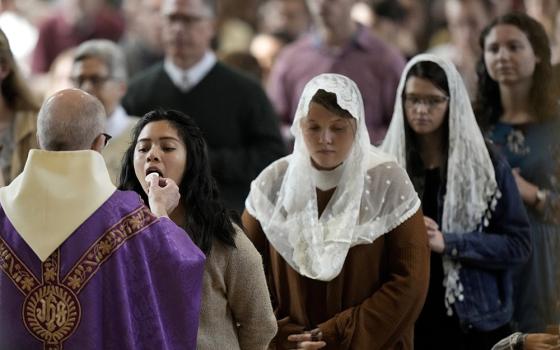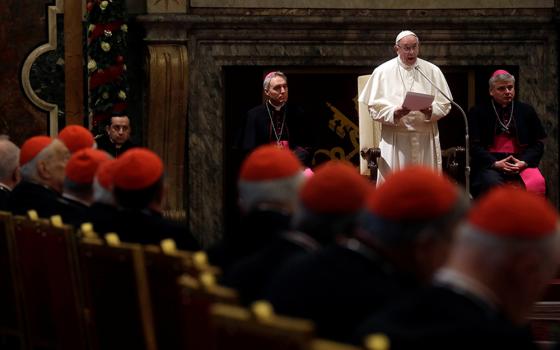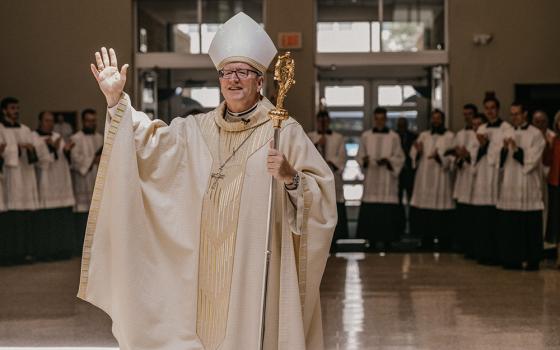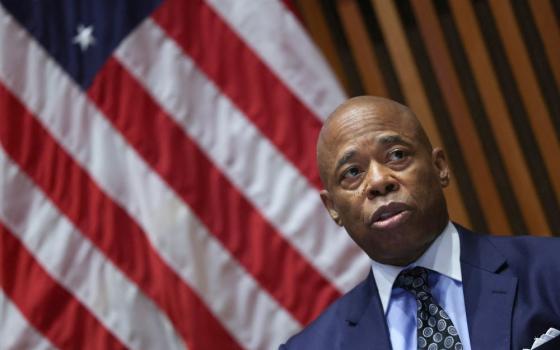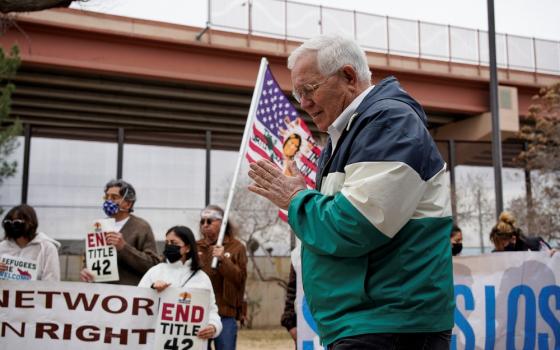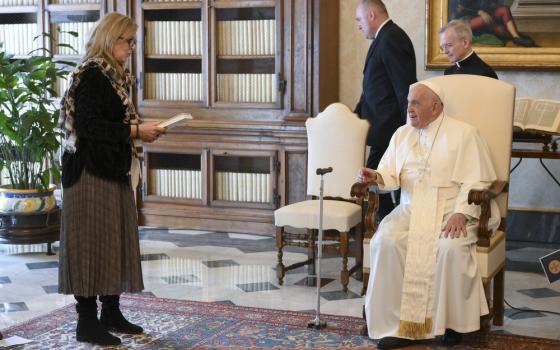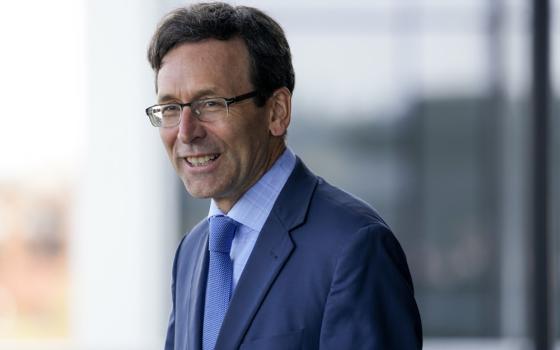Buildings destroyed by Israeli airstrikes are seen in Gaza City Oct. 10, 2023. Israel launched the airstrikes in retaliation for the assault on the country by Hamas. (OSV News photo/Mohammed Salem, Reuters)
A Jesuit priest who directs an ecumenical institute in Jerusalem told OSV News he feels "a deep sense of compassion for what Israelis and Palestinians" are experiencing amid a war that has so far killed at least 2,300.
Fr. John Paul, rector of the Tantur Ecumenical Institute spoke with OSV News Oct. 11, four days after Hamas militants from the Gaza Strip stormed into approximately 22 locations in Israel, gunning down civilians and taking some 100-150 hostages, including infants, the elderly and people with disabilities.
The coordinated attack took place on a Sabbath that marked the final day of the Jewish holiday of Sukkot, which celebrates the gathering of the harvest and the divine protection of the ancient Israelites as they escaped from slavery in Egypt.
Israel declared war on Hamas Oct. 8, placing Gaza under siege and pounding the region with airstrikes. Hamas has continued to launch strikes against Israel. As of late Oct. 11, 1,200 people in Israel and more than 1,100 people in Gaza have been killed.
At Tantur -- part of the University of Notre Dame and located on a 40-acre hilltop campus between Bethlehem and Jerusalem -- about 25-30 students and staff spent more than seven hours sheltering when the attacks began, said Paul.
"The sirens went off about 8:10 a.m. And of course, when the sirens go off, everyone is expected to go into a shelter," he said. "We basically stayed in the shelter until 3:30 or so in the afternoon, because about every half hour to 40 minutes, the sirens would go off again."
He said that "one missile landed about a mile and a half to the west of Tantur, between a Palestinian city and a Jewish settlement."
As Israel's Iron Dome air defense system countered Hamas' strikes, "throughout the day, we could hear these overhead explosions where the rockets were being destroyed in midair," said Paul.
For the institute's students and continuing education participants, the time spent sheltering was "a very, very new experience," said Paul -- but for Tantur's largely Israeli and Palestinian staff, "it was a realization that this was not just a repeat of the Gaza conflict two years ago, but something very different," he said.
The University of Notre Dame evacuated its students Oct. 10, relocating them to the university's London Global Gateway campus, he said.
"The university was quite concerned about their safety and well-being, not knowing how long this conflict is going to go on and how intense it's going to get," said Paul.
Tantur's continuing education students, most of whom are clergy and religious as well as some laypeople, "were much more thrown" by the attacks, he said.
Four who were days away from completing their six-week program "left … to return to their home countries," said Paul. "I think a couple of those were really quite shaken and really felt like they needed to leave."
One was summoned back to Nigeria at the insistence of her religious community, he said, adding that the woman's mother also had fallen ill.
But many of the staff who were able to return home -- either to Bethlehem or the nearby towns of Beit Jala and Beit Sahour, all in Palestinian territory -- "were unable to return [to Tantur] because the borders are closed," said Paul.
Advertisement
A few staff have remained at the institute, he said.
And "everyone here, both Israeli and Palestinian, is very traumatized by all of this," said Paul. "There's a great deal of stress. There's a great deal of tension. There's a lot of insecurity because of not knowing what's actually going to happen from here on out."
In listening to his staff, "my heart just breaks for them," said Paul.
The institute's Palestinian workers suffer from "a very high anxiety level, because many of them lived through the first and second intifadas," he said, referring to two Palestinian uprisings that took place 1987-1993 and 2000-2004, respectively.
Israeli staff have "lived now with the realization, 'We too are under threat. We too live under a great deal of fear. We're not as safe and secure as we thought we were,'" said Paul. "So really both sides are traumatized by all of this."
"Violence only perpetuates more violence," he said. "War traumatizes everybody. And war only deepens fear. It deepens suspicions. It deepens hatred."
Paul said he looks for "a deep-seated peace," one that is not simply a cessation of hostilities but that "really gets to the heart, to the deeper issues that have not been dealt with over the years."
That task is a mission for the global community itself, he added.
"The solution of those deeper issues and problems is not just between the Israelis and the Palestinians. It's not just between the U.S. and Israel and the various Arab nations around here," he said. "The whole world has to step in to assist in bringing about a faith that's rooted in justice that really allows everyone in this Middle East to be feeling much more at peace and secure.”
Tantur -- initiated by Pope St. Paul VI, and committed to fostering both ecumenical and interfaith encounter -- can serve as a "lighthouse of hope" that illuminates the way to "build bridges of greater understanding and communication," said Paul.
"This place is in an area filled with religious spiritualities," he said. "I wake up every day hearing the Muslim call to prayer, five times a day. I hear and see around me the Shabbat hymns that call people to the beginning or end of Shabbat. I see people dressed in a wide variety of traditional Jewish clothing. I hear church bells that ring here all the time.
"But what do I envision [peace] looking like? People going back into their scriptures and really studying and listening carefully," he said. "What does it mean to live what the Gospel, the Quran, the Hebrew Scriptures are calling us to? How do we care for the orphans, the widows, the strangers? How do we care for and really live with the sense that we are all created in the image and the likeness of God?
"To put it in Jesus' words, 'You will love the Lord your God with all your heart, mind and soul, and your neighbor as yourself," said Paul. "I think all three of these major faith traditions really seek that this is what we're called to live."





